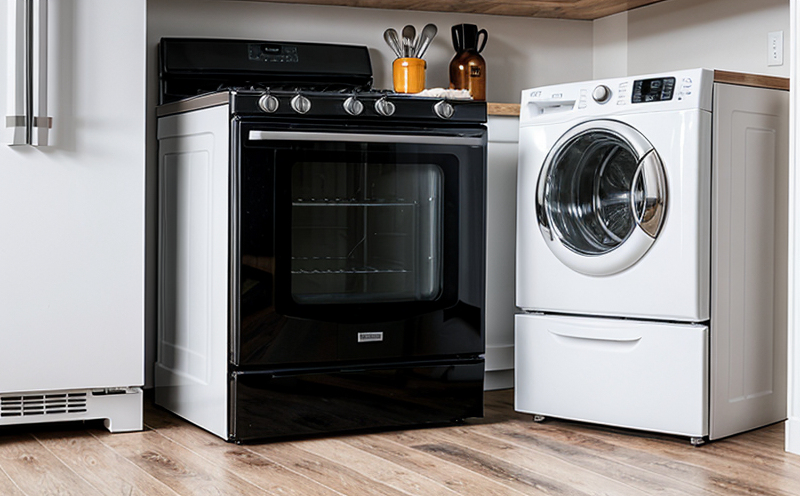Dielectric Strength Testing for Household Appliances
In today’s fast-paced consumer world, ensuring product safety is paramount. Dielectric strength testing plays a crucial role in safeguarding consumers from potential electrical hazards while enhancing the reliability and longevity of household appliances. This test measures an appliance's ability to withstand high voltage without causing insulation breakdown or arcing.
Consumer products face rigorous scrutiny due to their direct interaction with users, especially those that involve electricity. Household appliances such as refrigerators, washing machines, and microwaves are no exception. These devices operate within confined spaces where electrical failures could lead to severe accidents. Dielectric strength testing ensures these appliances meet strict safety standards set forth by regulatory bodies like the International Electrotechnical Commission (IEC), Underwriters Laboratories (UL), and others.
The test involves applying a controlled voltage between different parts of an appliance, including its metal casing and internal components, to determine if any insulation fails. A successful test indicates that the appliance can safely handle higher voltages without compromising safety. This is particularly important for appliances with exposed circuits or those operating in damp environments.
For R&D engineers, dielectric strength testing helps refine product designs by identifying potential weaknesses early in the development cycle. Quality managers and compliance officers rely on this test to ensure that products comply with local and international safety regulations. By integrating dielectric strength testing into their quality assurance processes, manufacturers can significantly reduce recall costs associated with product failures.
Dielectric strength tests are not just confined to new designs but also serve as a critical step in the production process. Regular testing ensures that mass-produced appliances consistently meet the required safety standards. This is especially important for large-scale manufacturing operations where even small deviations can have significant financial implications.
The importance of dielectric strength testing extends beyond mere compliance. It enhances brand reputation by demonstrating a commitment to consumer safety and satisfaction. In an era where product recalls can damage a company's image, investing in robust quality assurance measures like dielectric strength testing is essential for maintaining trust with customers.
Scope and Methodology
| Aspect | Description |
|---|---|
| Test Specimen | The specimen under test is typically the metal casing of the appliance, along with any internal components that may come into contact with electricity. The specific parts tested depend on the type of appliance and its intended use. |
| Voltage Applied | The voltage applied varies depending on the appliance's rated voltage but generally ranges from 500V to 1,000V AC or DC. The exact value is specified in accordance with relevant standards. |
| Test Duration | The test typically lasts for 1 minute at the applied voltage. This duration allows sufficient time for any insulation breakdown to occur without causing damage to the appliance or risking injury. |
| Acceptance Criteria | If no flashover, arcing, or breakdown of insulation is observed during the test, the specimen passes. The absence of these phenomena indicates that the dielectric material used in the appliance can withstand the specified voltage without failure. |
Why Choose This Test
Dielectric strength testing is an essential step in ensuring product safety, especially for household appliances. By performing this test early in the design and production process, manufacturers can identify potential weaknesses before they become costly issues down the line.
The test results provide valuable insights into the durability of the appliance's insulation, which is crucial for products that operate in environments with varying levels of humidity or those that may come into contact with water. This information helps engineers make informed decisions about material selection and design modifications to improve safety and performance.
From a regulatory standpoint, compliance with international standards such as IEC 60335-2-21 ensures that products meet the necessary safety requirements for sale in global markets. By adhering to these standards, manufacturers can avoid costly recalls and legal actions associated with non-compliance.
In addition to enhancing product safety, dielectric strength testing also contributes to brand reputation. Consumers increasingly demand products that are not only functional but also safe to use. Demonstrating a commitment to quality through rigorous testing procedures like this one helps build trust and loyalty among customers.
Customer Impact and Satisfaction
The impact of dielectric strength testing on customer satisfaction cannot be overstated. When households know that the appliances they purchase have undergone rigorous safety tests, it instills confidence in their purchasing decisions. This sense of security translates into higher levels of customer satisfaction and loyalty.
Manufacturers who invest in quality assurance measures like this one are better positioned to respond effectively to market demands for safer products. By continuously improving product safety through testing, companies can enhance their reputation as leaders in innovation and consumer protection.
The long-term benefits of implementing dielectric strength testing extend beyond immediate customer satisfaction. It also helps prevent costly recalls and product liability issues, which can severely damage a company's financial health and public image. By prioritizing safety from the outset, manufacturers can avoid these pitfalls altogether.





